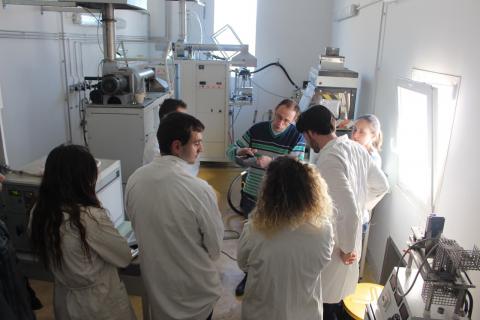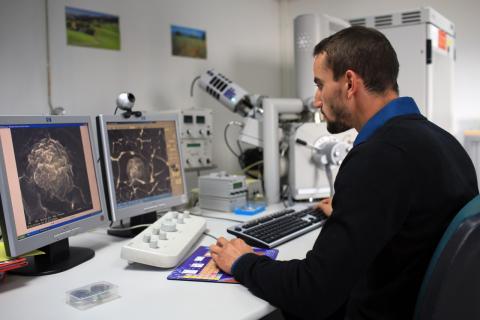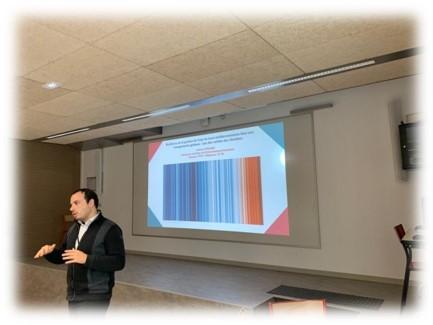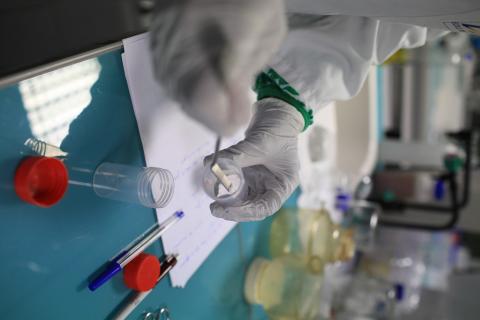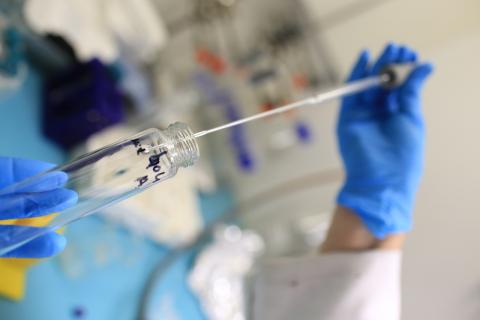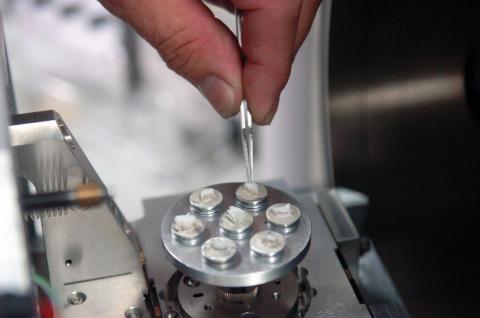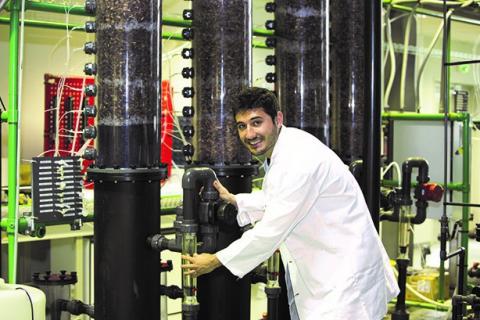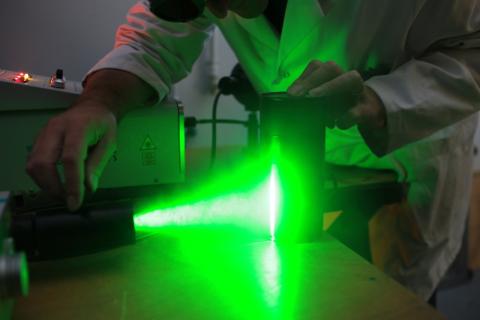Umberto Eco, In « Comment écrire sa thèse »The thesis can be experienced as a game, as a bet, as a treasure hunt. There is a sporting satisfaction in giving chase to an untraceable text, a puzzle-breaker's satisfaction in finding, after thinking about it for a long time, the solution to a problem that seemed insoluble.
The national doctoral degree
The doctorate is a professional research experience, undertaken by a graduate of a master's degree or an engineering school, and which leads, after the defense of a thesis, to the attribution of the degree of doctor. This is the highest degree awarded by French higher education.
The main part of the doctoral program consists of three years of innovative research work, supervised by a doctoral research director (a teacher-researcher at IMT Mines Alès who is authorized to direct research), carried out within an IMT Mines Alès research unit. It concludes with the writing of a thesis manuscript and its defense, i.e. a summary of the scientific work carried out, validated by the scientific community.
The research work must be innovative, i.e. new and involve a revision, a transformation of the existing. It is structured by the invention or construction of know-how, technologies, or in the broadest sense, of tools - whether conceptual or methodological - that are innovative, and whose conception has allowed the development of new knowledge or the extension of capacities for action.
The doctorate enables the construction, acquisition and dissemination of know-how and specialized disciplinary and interdisciplinary knowledge, as well as more general skills (project management, presentation techniques, languages and communication, etc.), which are valued and sought after both in the public service of higher education and research and in the entire socio-economic fabric (industrial R&D centers, innovation departments in companies, innovative start-ups, etc.). This set of skills also includes strategic vision, the management of uncertainty and even failure, and makes the doctor an essential player in society, increasingly confronted with change, unpredictability and increased global competitiveness.
In return for the research work they do, doctoral students receive a salary or a grant.
The doctoral student thus has the dual status of student and employee of IMT Mines Alès.
In France, the doctorate is governed by the modified ministerial order of May 25, 2016.
There are many players in the doctoral program. In addition to the doctoral student and his/her thesis director, there may also be a co-director or even a co-supervisor. They are surrounded by the employer, the funder (who may be different from the employer), the IMT Mines Alès research unit and team, the enrolling institution, the doctoral school, the doctoral college, any partners and the doctoral students' association.
-
The doctoral student
Once recruited, the doctoral student becomes the key player in this project. The doctoral student is trained through research. Even though they are in training, they are above all "agents of research production": they design new know-how; they develop technical or methodological tools; they produce knowledge.
-
The thesis director
The thesis director is a key player. He or she is responsible for developing the doctoral project. For three years, as the doctoral student's direct supervisor in the research unit, he or she is responsible for monitoring the research project and supporting the development of the young researcher's professional project. In order to be a thesis director, IMT Mines Alès faculty members must hold a specific diploma: the habilitation to direct research (HDR).
In addition to the thesis director, there is sometimes a co-director, or even a co-supervisor, especially for multidisciplinary or partnership doctorates.
-
The employer
Apart from cases where the doctoral student has a grant (for example, from his/her country of origin for international doctoral students), the doctoral student has the status of an employee and has an employment contract signed with an employer.
This employer may be IMT Mines Alès but may also be a partner organization involved in the doctoral project.
-
The funder
To carry out a doctoral project, financial resources are needed. It is the funder's responsibility to provide these resources (which may be different from the employer). The funder may be IMT Mines Alès, but it may also be another public organization (European Commission, ANR, local authority, etc.) or private organization (company, association, etc.) involved in the doctoral project.
-
The host research unit and team
All doctoral projects are necessarily developed in an IMT Mines Alès research unit, and more specifically, in one of the IMT Mines Alès research teams. This is the place where the doctoral student will work for three years, with his/her thesis supervisor and other colleagues. The research units are placed under the scientific responsibility of a "unit director". The research teams are placed under the responsibility of a "team leader".
-
The registration institution
The registration institution is the institution that registers the doctoral student and issues the title of doctor as part of its doctoral policy. This institution is generally IMT Mines Alès but can also be another institution, particularly in the case of joint doctoral programs. To be authorized to award the doctoral degree, an institution must be accredited by the Ministry of Higher Education and Research. IMT Mines Alès has had this accreditation since 2015. At IMT Mines Alès, the registration and doctoral graduation procedures are handled by the Research and Doctoral Department (DRED).
-
The doctoral school
Doctoral schools are the internal bodies of public institutions authorized to award doctorates, which implement doctoral training. In most cases, the doctoral schools are shared by several institutions in order to pool their resources. This is the case for the four doctoral schools in which IMT Mines Alès is accredited.
Under the responsibility of the accredited institutions, the mission of the doctoral schools is to organize the training of doctoral students and to prepare them for their professional activity after their doctoral training. They bring together research units and teams from the institutions concerned.
Each doctoral school has a director and a board, which intervene at different stages of the doctoral program (jury, training, regular follow-up, oral, etc.).
Each doctoral school has a "doctoral charter", approved by the participating institutions, which sets out the conditions for monitoring and supervising doctoral students. This charter is signed by the doctoral student and his or her thesis director when they first register.
-
The doctoral college
The doctoral schools are grouped together in doctoral colleges, which manage the transversal aspects common to the participating doctoral schools. They complement the systems set up by the doctoral schools and promote mutualization. In particular, the doctoral colleges manage the general training that is of interest to all doctoral students, while the doctoral schools manage the specific training.
The four doctoral schools in which IMT Mines Alès is accredited are grouped into two doctoral colleges.
-
The partners
Many doctoral projects are carried out in collaboration with partners (laboratories, companies, local authorities, etc.), with whom the doctoral student, his or her thesis director and research team interact regularly.
-
The PhD students' association
IMT Mines Alès doctoral students are members of the ATHEMA association ("Association des thésards de l'École des mines d'Alès").
ATHEMA establishes links between the doctoral students of the different research units and teams of IMT Mines Alès. It organizes training courses, events and scientific, sporting or cultural activities in order to participate in the integration of all doctoral students. It establishes privileged links with the school's services (research and doctoral department, general secretariat, etc.). ATHEMA participates in the sharing of scientific knowledge and in the promotion of the doctorate and research in general. In particular, ATHEMA co-organizes each year with the school the "Research Day".
In the case of collaboration with a partner (company, foreign institution, local authorities, administration, association, etc.), the doctoral research project is, of course, developed with the partner, whether the idea for the doctoral project comes from their own initiative or that of the research team. The IMT Mines Alès research team and the thesis director ensure that the project meets the requirements of a doctorate, especially when it is planned to take place partly at the partner's place.
In addition, there are national mechanisms to encourage and support the establishment of partnerships for doctoral projects, including
- The CIFRE scheme, Industrial Conventions for Training through Research (since 1981), in the private sector or the public sector (local authorities and public actors). This scheme, managed by the ANRT, the French National Association for Research and Technology, allows a partner (company, local authority, administration, association, etc.) to recruit a doctoral student on a permanent or fixed-term contract.
- The international doctoral co-supervision program allows a doctorate to be carried out between a French institution and a foreign institution.
The purpose of the CIFRE program is to strengthen exchanges between public research laboratories and companies, to promote the employment of PhDs in companies and to contribute to the innovation process of companies established in France.
The CIFRE scheme enables companies to receive financial assistance to recruit a young doctoral student whose research work, supervised by a public research unit, will lead to the defense of a doctoral thesis. The Cifre program involves three partners:
- a company, which entrusts a doctoral student with the research work that is the subject of his or her thesis
- one of the IMT Mines Alès research units, which provides the scientific supervision of the doctoral student;
- a doctoral student.
The CIFRE system is managed by the National Association for Research and Technology (ANRT), which is the French public-private sector research network.
The international co-supervision of a thesis is a kind of international double doctorate, at the end of which the doctoral student receives two doctoral degrees (one French degree and one foreign degree).
The cotutelle de thèse is a system that promotes the mobility of doctoral students by developing scientific cooperation between French and foreign research teams. The co-tutored student carries out his/her work under the supervision of a thesis director in each of the two countries concerned. The two thesis directors agree to act as tutors for the doctoral student; their skills are therefore exercised jointly. The doctoral student must carry out his or her research in the two countries of the cotutelle according to the terms established by an agreement. A framework agreement or a specific agreement between the institutions can be used to relax the conditions for the successful completion of the thesis.
En savoir plus sur les doctorats en cotutelle internationale
The PhD at IMT Mines Alès
In its six research units, IMT Mines Alès trains student researchers, called doctoral students, who prepare a doctorate in science and technology. Since 2015, the school has been accredited to award the doctoral degree within 5 doctoral schools (ED).
IMT Mines Alès is also a partner in the two doctoral colleges in the eastern part of the Occitanie region.
After three years of research during which they participate in the life of the research unit, whether it be in terms of research projects (regional, national or European) or publication work (articles presented at national or international conferences and publications in scientific journals), doctoral students defend a high-level dissertation and are then awarded the degree of doctor.
In 2021, the school trained 104 doctoral students, including 49 foreign students (19 nationalities). 19 theses were successfully defended.
After graduation, they join a company, choose to start a career in a higher education and research institution (for those considering an academic career) or create their own start-up.

The 5 doctoral schools
IMT Mines Alès is co-accredited to deliver the doctoral degree within 5 doctoral schools:
- Biodiversity, Agriculture, Food, Environment, Land, Water (GAIA)
- Information, Structures and Systems (I2S)
- Balard Chemical Sciences (SCB)
- Risks and Society (R&S)
The institutions co-accredited to award the doctorate within the doctoral school Biodiversity, Agriculture, Food, Environment, Land, Water (GAIA, ED n° 584) are the University of Montpellier, Montpellier SupAgro, IMT Mines Alès and AgroParisTech. The ED GAIA is placed under the responsibility of its director Mr. Marc Bouvy. The institution in charge of its administrative management is the University of Montpellier.
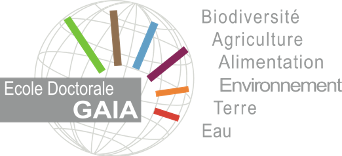
The ED GAIA gathers about 550 PhD students hosted in about 55 research units of the following institutions: University of Montpellier, Montpellier SupAgro, IMT Mines Alès, AgroParisTech, CNRS, INSERM, INRAE, INRIA, IRD, CIRAD, IFREMER.
The GAIA ED is positioned in the following scientific fields
- Agro-resources, Processes, Foods, Bioproducts
- Biology of Interactions
- Integrative Biology, Diversity and Plant Improvement
- Ecology, Evolution, Genetic Resources, Paleobiology
- Functional Ecology and Agronomic Sciences
- Earth and Water Sciences
Within IMT Mines Alès, ED GAIA is the doctoral school of affiliation for doctoral students hosted in the HSM (Hydrosciences Montpellier) and PCH (Polymers, Composites, Hybrids) research units.
Consulter la charte du doctorat de l’ED GAIA
Consulter le site internet de l’école doctorale
The ED GAIA is attached to the doctoral college of the University of Montpellier.
The establishments co-accredited to deliver the doctorate within the Information, Structures and Systems doctoral school (I2S, ED n° 166) are the University of Montpellier and IMT Mines Alès. The ED I2S is placed under the responsibility of its director Mr. Pascal Nouet. The institution in charge of its administrative management is the University of Montpellier.
The ED I2S gathers nearly 400 PhD students hosted in a dozen research units of the following institutions: University of Montpellier, IMT Mines Alès, CNRS, INRA, Montpellier SupAgro, CIRAD, AIST.
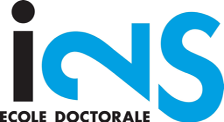
The I2S ED is positioned in the fields of Mathematics, Computer Science, Physics, Mechanics, Electronics, Microelectronics, Production Engineering, Robotics and Automation, as well as their applications, particularly for the environment and the living world.
Within IMT Mines Alès, the I2S ED is the doctoral school of affiliation for doctoral students hosted in the LMGC (Mechanics and Civil Engineering Laboratory), LSR (Risk Sciences Laboratory), and EuroMov-DHM (Digital Health in Motion).
Consult the I2S ED doctoral charter
Consult the website of the doctoral school
The ED I2S is attached to the doctoral college of the University of Montpellier.
The establishments co-accredited to deliver the doctorate within the "Balard Chemical Sciences" doctoral school (SCB, ED n° 459) are the University of Montpellier (UM), the Ecole Nationale Supérieure de Chimie de Montpellier (ENSCM) and IMT Mines Alès. The ED SCB is placed under the responsibility of its director Mr. Jean-Jacques Vasseur. The institution in charge of its administrative management is the University of Montpellier.
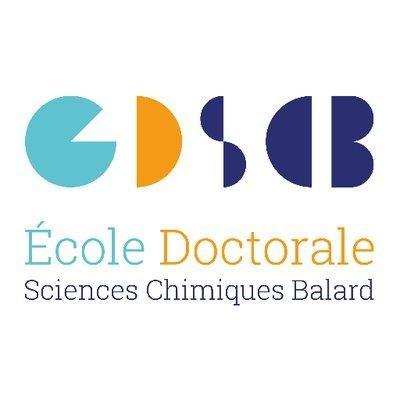
The SCB ED gathers about 250 PhD students hosted in 7 research units of the following institutions: University of Montpellier, ENSCM, IMT Mines Alès, CNRS, CEA.
The doctoral school is positioned in the field of chemistry and also aims to preserve the existing strong links between Chemistry and its natural interfaces, which are Physics on the one hand (materials) and Biology on the other hand (biomolecules). The SCB ED is part of the policy of structuring Chemistry in the Montpellier region with the creation of the Pôle Chimie Balard which brings together the vast majority of chemists in the region.
Within IMT Mines Alès, the SCB ED is the doctoral school of affiliation for doctoral students hosted in the PCH (Polymères, composites, hybrides).
Consult the SCB ED doctoral school charter
Consult the website of the doctoral school
L’ED SCB is attached to the doctoral college of the University of Montpellier.
The establishments co-accredited to deliver the doctorate within the doctoral school Risks and Society (R&S, ED n° 583) are IMT Mines Alès and the University of Nîmes. The ED R&S is placed under the responsibility of a management team composed of Mrs. Karine Weiss (director) and Mrs. Sophie Sauvagnargues (deputy director). The establishment in charge of its administrative management is the University of Nîmes.
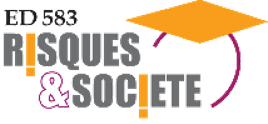
The ED R&S is a multidisciplinary doctoral school positioned in the broad field of natural, technological and environmental risk and its implications on health (health risk) and on organizations and society (management, destabilization, resilience).
Within IMT Mines Alès, the ED R&S is the doctoral school of affiliation for doctoral students hosted in the LSR research units (Risk Sciences Laboratory).
Consult the ED R&S doctoral school charter
Consult the website of the doctoral school
The ED R&S is attached to the Languedoc-Roussillon doctoral college.
The 2 doctoral colleges
IMT Mines Alès is a partner of the two doctoral colleges in the eastern part of the Occitanie region:
- University of Montpellier doctoral college
- Languedoc-Roussillon doctoral college
The partner institutions of the University of Montpellier (UM) doctoral college are, in addition to the UM:
Montpellier SupAgro, Chimie Montpellier, IMT Mines Alès, AgroParisTech.
The doctoral college of the University of Montpellier is placed under the responsibility of its director Mr. Marc Bouvy. The institution in charge of its administrative management is the University of Montpellier.
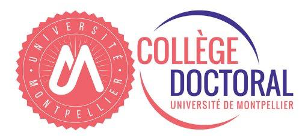
The doctoral college of the University of Montpellier includes 7 doctoral schools with a total of about 2000 doctoral students.
The doctoral college of the University of Montpellier is the college of the ED GAIA (Biodiversity, Agriculture, Food, Environment, Earth, Water), I2S (Information, Structures and Systems) and SCB (Balard Chemical Sciences).
The partner institutions of the Languedoc-Roussillon doctoral college are: Université Paul-Valéry Montpellier 3, Université Perpignan Via Domitia, Université de Nîmes, IMT Mines Alès
The Languedoc-Roussillon doctoral college is under the responsibility of its director, Mr. Nicolas Inguimbert. The institution in charge of its administrative management is the University of Nîmes.
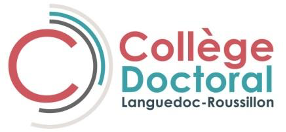
The Languedoc-Roussillon doctoral college includes 5 doctoral schools with a total of approximately 1000 doctoral students.
The Languedoc-Roussillon doctoral college is the college of affiliation for the ED R&S (Risks and Society).
The professional future of our PhDs after graduation
After their thesis defense, IMT Mines Alès graduates :
- Join R&D departments or innovation departments in industry
- Embark on a career in higher education and research
- Launch an innovative start-up based on the project they developed during their PhD
Each year, IMT Mines Alès conducts a study on the future of its PhDs. The study below was conducted in 2019 for 113 PhDs who prepared their PhD under the supervision of an IMT Mines Alès teacher-researcher and who defended their thesis between 2013 and 2018 (with a very satisfactory response rate of 93%).
Here are the main results:
- 95% of the graduates who responded are satisfied or fully satisfied with their current professional situation.
- The employment rate is 90%. It is 100% for graduates in 2015 or earlier.
- Two-thirds of working PhDs are on permanent contracts. Most of the CDDs are early career postdocs.
- More than half (57%) of working PhDs work in the private sector. Jobs in the private sector are very often on permanent contracts (84%).
- Jobs in the public sector are predominantly on fixed-term contracts (53%). Among working PhDs, 15% have a permanent position in higher education and research (lecturer or equivalent); the majority of graduates obtain these positions from the fourth year following their thesis.
- The positions are mainly in France (83%); abroad, the positions are mainly outside Europe (14%, against 3% in Europe).
- Two thirds of the jobs in France are in the private sector. Abroad, three-quarters of the positions are in the public sector.
51%
of PhDs work in companies.
17%
of PhDs work abroad.
95%
are satisfied or very satisfied with their situation.
Students: becoming a doctoral student
Are you interested in careers in higher education and public research?
A doctorate is the ideal way to enter higher education and public research, whether in universities, engineering schools or national research organizations (CNRS, CEA, etc.).
Are you interested in careers in R&D and innovation in the private sector?
At IMT Mines Alès, our doctoral students work on scientific and technological themes that meet the needs of industrial companies and society. More and more industrial companies are looking for young PhDs, especially those who prepared their thesis in engineering school. More than half of our PhD graduates work in the private sector.
Would you like to devote yourself fully to a subject you are passionate about for 3 years of your life?
This opportunity may not come up again in your life. Indeed, this is a unique moment allowing you to deepen a specific problematic. You will be able to take the time to answer a scientific question and to produce knowledge that will fuel reflections on both disciplinary and societal issues. Through the doctorate you will have the opportunity to find answers to your subject but also about yourself, thus developing your personal and professional aspirations. Writing a dissertation is a path to take, not an end in itself.
Do you want to obtain a degree that is highly recognized internationally?
In many countries, especially in the English-speaking world, the doctorate is the flagship degree. A valuable international passport.
Do you want to become the leading expert in your scientific field and have a strong international reputation?
At the end of your doctorate, you will have developed extensive expertise in the subject of your thesis. You will be one of the few experts on the subject and your competence will be sought after on an international scale. You will have contacts with your scientific community worldwide and will participate in international scientific conferences and symposia.
Do you want to develop an innovative idea with a view to creating your own start-up?
You will be able to take advantage of your three years of doctoral studies in contact with high-level researchers to develop your innovation project and, why not, file a patent. The IMT Mines Alès incubator will also be there to support you in all aspects of business creation.
Do you want to develop your skills, know-how and interpersonal skills?
In addition to your scientific expertise, the PhD adventure will allow you to develop your skills in analysis, creativity, open-mindedness, critical thinking, collaborative work, adaptability, project management, writing, presentation, working in English...
Would you like to benefit from a privileged environment on a human scale?
At IMT Mines Alès, our doctoral students benefit from a privileged working environment. The school has significant and sought-after experimental and technological resources. As an engineering school, IMT Mines Alès is a family on a human scale, with a very accessible staff. The doctoral students all know each other and are part of an association that organizes various convivial events.
Are you an engineer who wants to complement your generalist background with strong expertise in a particular field?
More and more engineers are deciding to pursue a PhD every year. While your engineering background provides you with a strong capacity for technological integration, your doctorate will provide you with a very complementary scientific expertise. More and more industrial companies are looking for doctoral engineers: in Saint-Gobain's R&D centers, more than 80% of the engineers hired also have a doctorate.
Would you like to experience an intense scientific and human adventure?
"The thesis can be seen as a game, as a gamble or even a treasure hunt. There is a sporting satisfaction in giving chase to an untraceable text, a puzzle-breaker's satisfaction in finding, after long reflection, the solution to a problem that seemed insoluble." [...]
"It will have been like a first love: it will be difficult to forget."
Umberto Eco, in « Comment écrire sa thèse ».
The recruitment of a candidate in the first year "is confirmed by the head of the institution on the proposal of the director of the doctoral school, after the opinion of the thesis director and the director of the research unit or team on the quality of the project and the conditions of its realization."
The decree of May 25, 2016, as amended, sets the national framework for training and the procedures leading to the award of the national doctoral diploma. In order to be enrolled in a doctoral program, "a candidate must, unless an exemption is granted, hold a national master's degree or another degree conferring the grade of master, at the end of a training program establishing his/her aptitude for research."
For recruitment by IMT Mines Alès, the selection of the future doctoral student is submitted to a selection committee. This committee is made up of at least two people, including the future thesis director. The selection committee's role is to evaluate, during an interview, the skills sought in a doctoral student:
- a motivation for research and teaching activities
- a sufficient level of scientific culture and English for the subject of the thesis,
- a coherent professional project,
- analytical and synthesis skills,
- qualities of adaptability, creativity, innovation and communication.
When a doctoral student is recruited by a laboratory outside IMT Mines Alès or a company, no administrative action is required.
"A doctoral student is then placed under the control and responsibility of a thesis director who has full responsibility for the scientific direction of the doctoral student's thesis work."
For the selected candidate, the registration in the first year is done in a dematerialized way via the ADUM website (http:\www.adum.fr). For international candidates from outside the EU, a special instruction must be carried out with the assistance of the ITM Mines Alès Security Officer. Please contact the secretariat of the laboratory where the student is based as soon as possible to begin this procedure, which can take a long time.
Companies: host a PhD student to boost your R&D
Disruptions, technological evolutions, increasing competitiveness and national and international competition are all contextual elements likely to push you to innovate and invest in research and development (R&D) in order to preserve or develop your market share.
Hosting a PhD student within your company is an ideal response to boost your R&D, develop your assets and promote your return on investment.
PhD students have a strong expertise in research and innovation. They help you innovate more and differentiate yourself. Projecting into the future, managing breakthroughs, conceptualizing what doesn't exist, mastering complexity and uncertainty, putting the fundamentals into perspective - these are just some of the things they can do for you. With their research-oriented curriculum, doctoral students are the guarantors of your company's future innovation and creativity. Or at the very least, an excellent catalyst for it.
Because of their special position, doctoral students are able to act as an interface between the world of academic research and that of industry. In fact, in your own sector of activity, it allows you to forge links with teacher-researchers and to access high-level scientific expertise and equipment, within an appropriate legal contractual framework for the transfer of results and knowledge.
In addition to these numerous integration advantages, the salaries and support costs of doctoral students are tax-deductible. Whether through the CIFRE incentive scheme run by the ANRT or through an outsourced research contract, you benefit from an optimal economic return.
The system of hiring a doctoral student by the company for three years is eligible for the Research Tax Credit (CIR). IMT Mines Alès has a special status because when our research teams are asked to support a doctoral student, the State recognizes the following prerogatives
- automatic CIR approval, i.e., direct CIR eligibility for the invoice that the institution has generated for an industrialist as part of the research project by a doctoral thesis;
- the doubling of the value of this invoice in the expenditure base from which the industrialist's CIR is calculated the following year. In concrete terms, this means that your company will receive a CIR with a doubling of the eligible expenses, i.e. 60% of the invoice issued by the school in the framework of the thesis project.


